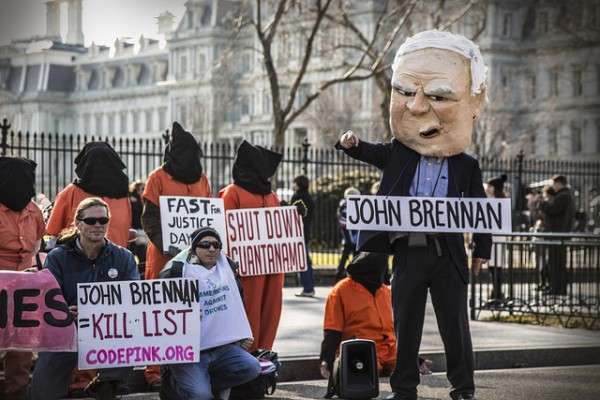
Photo Credit: Justin Norma, via Flickr
On Tuesday, the U.S. Senate Intelligence Committee released its findings of a 6,200 page report detailing a secret CIA program of detention and torture implemented under President George W. Bush. The 449-page executive summary outlines specific methods used by the CIA in attempts at gathering information from suspected Al Qaeda operatives between 2002–08, including the use of sleep deprivation, death threats, waterboarding, and medically unnecessary “rectal feeding.”
While many nations have since condemned the actions outlined in the report, Beijing was one of the more prominent critics. Chinese Foreign Ministry spokesperson Hong Lei was one of the more outspoken critics, stating “China has consistently opposed torture. We believe that the US side should reflect on this, correct its ways and earnestly respect and follow the rules of related international conventions.” The Beijing News dedicated an entire page to details of the report, including a map of where and how torture was carried out. State news agency Xinhua also published an editorial condemning the U.S. for its criticism of China’s human rights record, which says “China is open to dialogues and exchanges with other countries over its human rights issues and welcomes friendly advice and suggestions…In light of this, perhaps the U.S. government should clean up its own backyard first and respect the rights of other countries to resolve their issues by themselves.”
Of course, Beijing has the right to criticize the CIA for its practices, despite its longstanding hypocritical pledge to not interfere in the internal affairs of another country, but criticism coming from a country noted for its own human rights abuses is disingenous. For, despite promises to curb abuses, China has repeatedly been accused of its own acts of torture by international human rights groups and former detainees, including the practice of forced confessions.
Amnesty International has documented “an estimated 500,000 people who are currently enduring punitive detention without charge or trial,” along with “harassment, surveillance, house arrest, and imprisonment of human rights defenders on the rise.” Amnesty notes that the continued repression of certain minority groups, including the Uighurs, Tibetans and Mongolians, as well as Falun Gong practitioners and Christians who practice their religion outside state-sanctioned churches. And in a special report entitled “China’s Trade in Tools of Torture and Repression” released on Sept. 23, 2014, Amnesty International describes cases in which Chinese law enforcement personnel use electric shock equipment and restraints to torture detainees.
Since both the U.S. and China are signatories, along with 154 other states, of the 30-year old Convention Against Torture and Cruel, Inhuman and Degrading Treatment, perhaps now is the time for the leading executioner in the world to step up on the international stage and submit its own detailed findings on the human rights abuses undertaken in its own country. This is in no way an effort to detract, diminish or shift blame away from the inhumane treatment practiced by the CIA, but merely to build on the momentum gained from the release of the Senate Intelligence Committee report. While Beijing has acknowledged the problem of torture by implementing legal reforms to outlaw forced confessions, the international community would be especially interested in how effective these reforms have been to date. After all, as Mao Zedong once said, “To investigate a problem is, indeed, to solve it.”